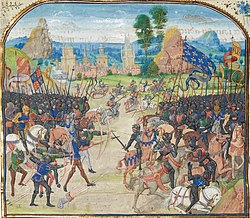Runtzid
A runtzid (English Rouncey , Rouncy or Rounsey , French roncin or roussin , Italian ronzino ) was a less valuable all-purpose horse used during the Middle Ages . The runtzid was mainly used as a pack horse , draft horse and pack horse , occasionally for pure riding, but also in battle .
etymology
The term "Runtzid" is related to the Italian terms "ronzone" and "roncione", all of which are derived from the old French "roncin", which in turn comes from the Middle Latin "roncinus", "runcinus" or "ronzinus" ("mountain horse", "Klepper").
Use in the art of war
While the Destrier was the most famous horse of the Middle Ages, it was the most uncommon, and coursers were the horses of choice for the tough battle . Both were expensive, highly trained specimens used by knights and nobles, while squires and poor knights used the runtzid for battle. A wealthy knight made Runtziden available to his entourage .
Occasionally the prospect of the fight determined the choice of horse; When a call for war was sent out in England in 1327 , the latter expressly requested Runtztiden for a quick pursuit instead of Destriern.
Footnotes
- ↑ Roß (3), das. Zeno.org, accessed January 5, 2014 .
- ↑ Ruth M. Hirschberg: Dextrarius - the great knight horse. Marca Brandenburgensis, 2013, accessed January 5, 2014 .
- ^ Carlo Battisti ; Giovanni Alessio: Dizionario etimologico italiano , Florence, Barbera, 1950–57
- ↑ Giacomo Devoto, avviamento all'etimologia italiana , Milan, Mondadori, 1979
- ↑ Grammatical-Critical Dictionary of High German Dialect: 3. Das Róß to Róßdienst (Vol. 3, Sp. 1163 to 1164). University of Trier , accessed on January 5, 2014 .
- ↑ Oakeshott, Ewart . A Knight and his Horse , Rev. 2nd Ed. USA: Dufour Editions, 1998
- ↑ Gravett, Christopher . English Medieval Knight 1300-1400 , Oxford: Osprey Publishing, 2002, p. 59
- ^ Michael Prestwich : Armies and Warfare in the Middle Ages: The English Experience , New Haven: Yale University Press, 1996, p. 318
